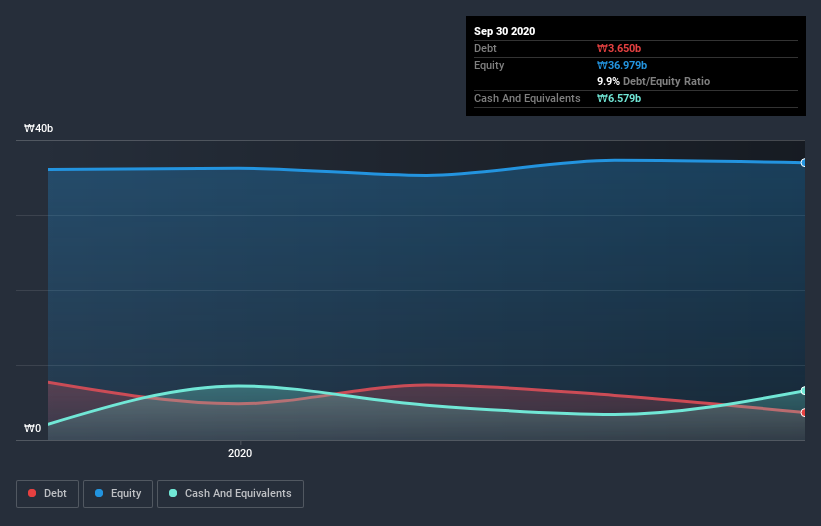- South Korea
- /
- Semiconductors
- /
- KOSDAQ:A313760
Willings (KOSDAQ:313760) Has A Somewhat Strained Balance Sheet
The external fund manager backed by Berkshire Hathaway's Charlie Munger, Li Lu, makes no bones about it when he says 'The biggest investment risk is not the volatility of prices, but whether you will suffer a permanent loss of capital.' It's only natural to consider a company's balance sheet when you examine how risky it is, since debt is often involved when a business collapses. We can see that Willings Co., Ltd. (KOSDAQ:313760) does use debt in its business. But should shareholders be worried about its use of debt?
When Is Debt Dangerous?
Debt and other liabilities become risky for a business when it cannot easily fulfill those obligations, either with free cash flow or by raising capital at an attractive price. Part and parcel of capitalism is the process of 'creative destruction' where failed businesses are mercilessly liquidated by their bankers. While that is not too common, we often do see indebted companies permanently diluting shareholders because lenders force them to raise capital at a distressed price. By replacing dilution, though, debt can be an extremely good tool for businesses that need capital to invest in growth at high rates of return. When we examine debt levels, we first consider both cash and debt levels, together.
See our latest analysis for Willings
What Is Willings's Net Debt?
As you can see below, Willings had ₩3.65b of debt at September 2020, down from ₩7.70b a year prior. However, its balance sheet shows it holds ₩6.58b in cash, so it actually has ₩2.93b net cash.

How Healthy Is Willings's Balance Sheet?
We can see from the most recent balance sheet that Willings had liabilities of ₩6.45b falling due within a year, and liabilities of ₩3.15b due beyond that. Offsetting these obligations, it had cash of ₩6.58b as well as receivables valued at ₩11.5b due within 12 months. So it can boast ₩8.52b more liquid assets than total liabilities.
This surplus suggests that Willings has a conservative balance sheet, and could probably eliminate its debt without much difficulty. Succinctly put, Willings boasts net cash, so it's fair to say it does not have a heavy debt load!
Shareholders should be aware that Willings's EBIT was down 83% last year. If that decline continues then paying off debt will be harder than selling foie gras at a vegan convention. The balance sheet is clearly the area to focus on when you are analysing debt. But it is Willings's earnings that will influence how the balance sheet holds up in the future. So when considering debt, it's definitely worth looking at the earnings trend. Click here for an interactive snapshot.
Finally, while the tax-man may adore accounting profits, lenders only accept cold hard cash. Willings may have net cash on the balance sheet, but it is still interesting to look at how well the business converts its earnings before interest and tax (EBIT) to free cash flow, because that will influence both its need for, and its capacity to manage debt. During the last two years, Willings burned a lot of cash. While investors are no doubt expecting a reversal of that situation in due course, it clearly does mean its use of debt is more risky.
Summing up
While it is always sensible to investigate a company's debt, in this case Willings has ₩2.93b in net cash and a decent-looking balance sheet. So although we see some areas for improvement, we're not too worried about Willings's balance sheet. There's no doubt that we learn most about debt from the balance sheet. But ultimately, every company can contain risks that exist outside of the balance sheet. For example, we've discovered 5 warning signs for Willings that you should be aware of before investing here.
Of course, if you're the type of investor who prefers buying stocks without the burden of debt, then don't hesitate to discover our exclusive list of net cash growth stocks, today.
If you’re looking to trade Willings, open an account with the lowest-cost* platform trusted by professionals, Interactive Brokers. Their clients from over 200 countries and territories trade stocks, options, futures, forex, bonds and funds worldwide from a single integrated account. Promoted
New: AI Stock Screener & Alerts
Our new AI Stock Screener scans the market every day to uncover opportunities.
• Dividend Powerhouses (3%+ Yield)
• Undervalued Small Caps with Insider Buying
• High growth Tech and AI Companies
Or build your own from over 50 metrics.
This article by Simply Wall St is general in nature. It does not constitute a recommendation to buy or sell any stock, and does not take account of your objectives, or your financial situation. We aim to bring you long-term focused analysis driven by fundamental data. Note that our analysis may not factor in the latest price-sensitive company announcements or qualitative material. Simply Wall St has no position in any stocks mentioned.
*Interactive Brokers Rated Lowest Cost Broker by StockBrokers.com Annual Online Review 2020
Have feedback on this article? Concerned about the content? Get in touch with us directly. Alternatively, email editorial-team@simplywallst.com.
About KOSDAQ:A313760
Carry
Engages in the manufacture and sale of power conversion systems in South Korea.
Moderate risk with mediocre balance sheet.
Market Insights
Community Narratives



